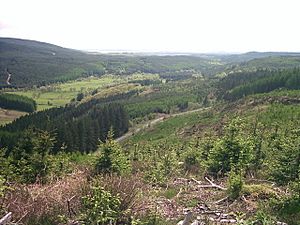Talnotrie Hoard facts for kids
Quick facts for kids Talnotrie Hoard |
|
|---|---|
| Created | c. 875–900AD |
| Period/culture | Early medieval |
| Discovered | 1912 Talnotrie, Scotland |
| Discovered by | Mrs Gordon |
| Present location | National Museums Scotland |
| Coordinates | 55°00′56″N 04°22′00″W / 55.01556°N 4.36667°W |
The Talnotrie Hoard is a special collection of old treasures. It includes jewellery, coins, tools, and raw materials. This amazing find was discovered in Talnotrie, Scotland, in 1912. Experts first thought it belonged to a metal-worker from Northumbria. Now, many believe it might be linked to the Vikings and their travels.
Contents
How the Talnotrie Hoard Was Found
The Talnotrie Hoard was found by accident in 1912. A woman named Mrs. Gordon was putting peat on her fire at home. Peat is a type of soil used as fuel.
As she added the peat, she saw something shiny fall out. It was silver! Her husband had collected the peat from a nearby hillside. He later said the treasures were deep inside the peat layers. They were found close to the "glacial clay," which is a type of ancient soil.
After the discovery, a man named Sir Herbert Maxwell wrote about the hoard in 1913. This helped tell the world about this exciting find.
What's Inside the Talnotrie Hoard?
The Talnotrie Hoard is a mix of many different items. It includes coins, jewellery, and things used for working with metal. There are also some raw materials.
Jewellery and Ornaments
The hoard contains beautiful jewellery pieces. These include two silver pins with round tops. There is also a separate pin-head. Another item is a strap-end made of niello, which is a black metal alloy. A gold finger-ring was also part of the treasure.
Metal-Working Tools and Materials
Some items in the hoard are linked to metal-working. There is a lead weight with a piece of copper-alloy woven into it. Two oval loops made of silver wire were also found. A broken or unfinished cross shows how items were made.
Raw Materials and Other Finds
The hoard also contained raw materials. These include a piece of jet, which is a black gemstone. There is also an unfinished piece of agate, a colorful stone. A piece of green glass and a substance like beeswax were also found. Three clay spindle whorls were part of the collection. These were used for spinning thread.
Ancient Coins
Many old coins were found in the hoard. There were six stycas, which were coins from Northumbria. Four pennies from Burgred of Mercia, an old English king, were also present. A small piece of a Carolingian denier from France was found. Two pieces of Islamic dirhams, coins from the Middle East, were also part of the treasure.
Where You Can See the Hoard
Today, the Talnotrie Hoard is kept safe at the National Museums Scotland. In 2021, parts of the hoard were shown in a special exhibition. This exhibition was about another famous treasure called the Galloway Hoard.
Gallery
 | Kyle Baker |
 | Joseph Yoakum |
 | Laura Wheeler Waring |
 | Henry Ossawa Tanner |



